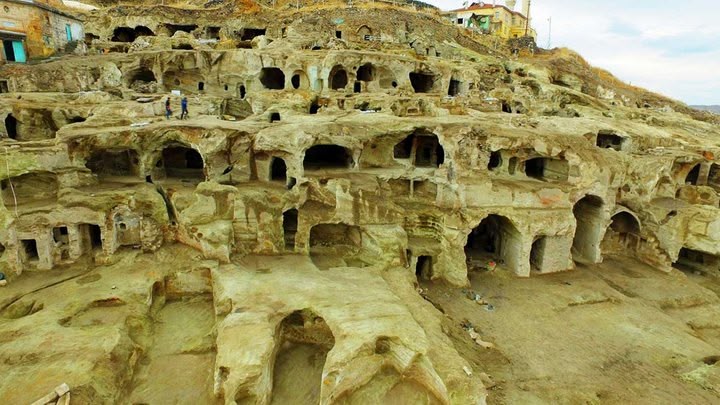Did you know: about the underground city Derinkuyu?
Derinkuyu was a vast, multi-level ancient underground city in Cappadocia, Turkey, built to shelter inhabitants from invaders, capable of housing 20,000 people with their livestock and supplies. Extending to a depth of about 85 meters (280 feet), it featured ventilation shafts, wells for water, chapels, stables, communal kitchens, and even a missionary school. The city, carved into the soft volcanic rock of the region, was rediscovered in 1963 and is now a major tourist site and a part of the region's UNESCO World Heritage site.
Key features and history:
Ancient Origins: The earliest parts of the city may have been carved by the Hittites around 1200 BCE, with the Phrygians and later Christians of the Byzantine era expanding upon it.
Purpose: Its primary purpose was as a refuge from various invaders, including the Arab-Byzantine Wars and later Mongolian invasions.
Engineering Marvels: The city included over 55 meters (180 feet) of ventilation shafts for fresh air, a deep well for water, and large stone doors that could roll to seal off passageways and isolate levels.
Discovery and Abandonment: After being sealed up by Christian inhabitants during their forced exile to Greece in 1923, it was accidentally rediscovered in 1963 when a man found a tunnel behind his basement wall.
Cultural Significance: Derinkuyu is a prime example of the many ancient underground cities in the Cappadocia region, a testament to human ingenuity in adapting to a challenging environment.
Tourism: Today, visitors can explore some of the city's 18 levels and experience the historical significance of this ancient subterranean metropolis.
What to expect when visiting:
Claustrophobia Risk: The narrow tunnels can be challenging for those with claustrophobia or other health concerns.
Guided Tours: An experienced guide is recommended to navigate the complex layout.
Historical Context: Visitors can discover the unique living conditions and ingenious engineering that allowed people to survive sieges underground for centuries.
Key features and history:
Ancient Origins: The earliest parts of the city may have been carved by the Hittites around 1200 BCE, with the Phrygians and later Christians of the Byzantine era expanding upon it.
Purpose: Its primary purpose was as a refuge from various invaders, including the Arab-Byzantine Wars and later Mongolian invasions.
Engineering Marvels: The city included over 55 meters (180 feet) of ventilation shafts for fresh air, a deep well for water, and large stone doors that could roll to seal off passageways and isolate levels.
Discovery and Abandonment: After being sealed up by Christian inhabitants during their forced exile to Greece in 1923, it was accidentally rediscovered in 1963 when a man found a tunnel behind his basement wall.
Cultural Significance: Derinkuyu is a prime example of the many ancient underground cities in the Cappadocia region, a testament to human ingenuity in adapting to a challenging environment.
Tourism: Today, visitors can explore some of the city's 18 levels and experience the historical significance of this ancient subterranean metropolis.
What to expect when visiting:
Claustrophobia Risk: The narrow tunnels can be challenging for those with claustrophobia or other health concerns.
Guided Tours: An experienced guide is recommended to navigate the complex layout.
Historical Context: Visitors can discover the unique living conditions and ingenious engineering that allowed people to survive sieges underground for centuries.






